If you’re interested in learning about psychology and how it applies in criminal justice settings, you might be interested in pursuing a criminal psychology degree online.

Editorial Listing ShortCode:
Criminal psychology is about more than crime scenes and criminal profiling. This field of study can actually be applicable to various industries and career paths.
Criminal Psychology Degrees Online

Many prominent careers in this field require advanced degrees and licensing, but there are related psychology and counseling careers that only require a bachelors for entry-level positions.
As a criminal psychology major, your psychology classes are likely to cover topics such as:
- General psychology
- Social psychology
- Sociology
- Behavioral and abnormal psychology
- Criminology
- Law enforcement procedures and methods
Many forensic psychology program graduates apply their training in roles involving:
- Criminal investigation and crime scene analysis
- Criminal profiling
- Behavioral assessments related to court proceedings
- Advising investigative agencies, trial lawyers, or judges
In addition to assessing and reporting, criminal psychologists might also construct and conduct psychology-related experiments or statistical research and analysis.
Editorial Listing ShortCode:
Other sub-specializations in a forensic psychology program include rehabilitation counseling, juvenile justice policy and interventions, crime victim counseling, and probation and correctional treatment services.
Criminal Psychology Careers & Salaries
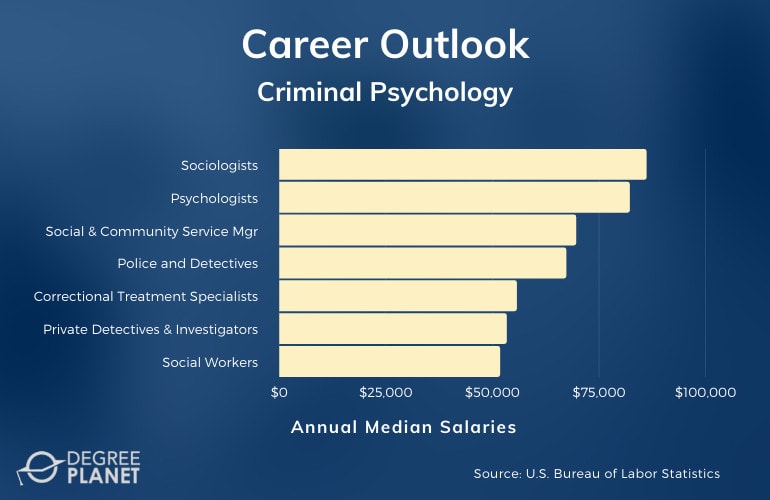
With the right degrees, licensure, and professional experience, criminal psychologists can work in public or private law enforcement and investigative agencies. They can also work in consulting roles for trial lawyers or judges.
Professionals in this field can also provide direct assessment, diagnostic, and therapeutic services in law enforcement or correctional settings. A number of criminal psychology pathways require advanced qualifications, such as graduate studies and licensure, in the field of psychology.
According to the Bureau of Labor Statistics, psychology majors may find work in law enforcement sectors, but they may also seek careers related to social work and mental health counseling.
| Careers | Annual Median Salaries |
| Sociologists | $86,110 |
| Psychologists | $82,180 |
| Social and Community Service Managers | $69,600 |
| Police and Detectives | $67,290 |
| Probation Officers and Correctional Treatment Specialists | $55,690 |
| Private Detectives and Investigators | $53,320 |
| Social Workers | $51,760 |
| Substance Abuse, Behavioral Disorder, and Mental Health Counselors | $47,660 |
| Rehabilitation Counselors | $37,350 |
| Social and Human Service Assistants | $35,960 |
Psychology has many branches. Those interested in criminal justice and psychology typically major in forensic psychology with criminal justice courses as part of their criminal psychology degree program coursework. A number of the careers listed above require additional education and licensure.
Criminal psychology majors who don’t plan to further their studies tend to pursue careers as social workers, mental health counselors, probation officers, or correctional treatment specialists. Some of these positions also require state licensure and specialized training.
Criminal Psychology Curriculum & Courses

Schools will vary in how they design programs in criminal psychology. Specific courses will also vary by school and program, but here’s a sampling of the kinds of courses and topics you’re likely to encounter in an online bachelor’s in forensic psychology:
- Introduction to General Psychology: This course is an overview of the fundamental tenets, topics, and investigative methods underlying the modern psychological theory, inquiry, and experimentation.
- Social Psychology: You’ll learn key concepts related to the study and analysis of human behaviors, beliefs, and attitudes as well as the social dynamics that influence them.
- Introduction to Sociology: This course is an overview of key topics in sociology. It covers fundamental concepts related to social and cultural norms and the understanding of the individual’s place in society in terms of conformity, alienation, and integration.
- Abnormal Psychology: You’ll study key topics related to psychological and behavioral disorders, including deviance and anti-social behaviors.
- Psychology and Criminal Justice: This foundational criminal psychology course covers topics at the intersection of psychology and law enforcement, such as assessing mental states of criminals, the theories of criminal behavior, rehabilitation methods and options, and crime scene investigations.
- Introduction to Psychoanalysis: This course is an overview of key principles and theories underlying the practice of psychoanalysis, including an overview of methods related to patient assessment, diagnosis, and treatment.
- Introduction to Applied Forensic Psychology: Building on principles of psychology and criminal justice, this course examines common practical applications of forensic psychology in criminal justice settings and scenarios.
- Behavioral Psychology: This course focuses on objective and experimentally-based theories of human behavior derived from experimental findings related to patterns of observed stimulus and response.
- Experimental Psychology: Both theoretical and hands-on, this course introduces students to basic concepts and practices used in psychological research, experimentation, and statistical analysis.
- Psychological Assessments: This course is an overview of principles and methods for psychological assessment, psychological profiling, and assessment reporting.
Since criminal psychology is a specialized branch of psychology, your bachelor’s program will also likely cover many general psychology topics, as well as forensic science, as a foundation for further specialization.
How to Choose an Online Criminal Psychology Program
When choosing an online degree program, whether it’s a criminal psychology program online or a criminal justice bachelors degree online, making a list of features can help you hone in on the right program for your individual study needs and for your professional goals and interests.
Editorial Listing ShortCode:
Here’s a list of factors you may want to consider as you go about choosing a forensic psychology program that fits your goals:
- Course offerings. Each program can have varying course offerings, including different specialized courses. You may want to keep an eye out for forensic science and criminal psychology courses, criminal justice courses, criminal behavior studies, and any other specializations that interest you.
- Length of program. This can include looking for full-time, part-time, or accelerated learning options aligned with your preferences.
- Learning formats. There are programs that offer online bachelor’s programs, as well as hybrid, or in-person learning options.
- Accreditation. Regional accreditation is a sign that a school is credible and offers high quality education.
- Student services. You can take stock of a school’s student services. Some offer tutoring support, academic and career counseling, peer networking opportunities, and school-to-work pipelines that can help you find a job after college.
- School’s reputation. You can look at statistics that might shine a light on a school’s reputation and academic quality. This can include a school’s graduation rates and average post-graduation employment rates and salary averages. You can also seek information about how graduates fare when applying to graduate school.
It’s strategic to look over course offerings and specializations in order to find programs that are aligned with your learning and career interests.
How to Become a Criminal Psychologist

A license is required for a professional in the field to practice as a criminal psychologist. It’s no small matter to provide reliable and objective psychological assessments and psychological guidance in sensitive settings, such as court proceedings and crime investigations.
Here are the general steps for becoming a professional, licensed criminal psychologist:
- Bachelor’s degree. Complete a bachelor’s degree, preferably in psychology or forensic psychology.
- Graduate degree. Earn a masters or doctoral degree, depending on your career goals and interests. Most clinical psychologist roles require a doctorate.
- Work experience. Get practical and relevant experience as required by your criminal psychology degree program or licensing board. This may include doing field work, internships, clinical practicums, residencies, or similar activities.
- Licensure. To obtain your license, you’ll pass a licensing exam and satisfy any remaining licensing requirements from your state board.
- Continuing education. Post-licensing, you’ll continue to engage in professional development and continuing education activities to renew your license at the specified intervals.
If you anticipate getting licensed down the road, it’s strategic to research your state’s licensing requirements for your field to ensure that your chosen degree programs meet your state board’s regulations.
Admissions Requirements

Admissions requirements vary by school and program, but here’s a sampling of what to expect:
- SAT or ACT scores (only some schools require them)
- High school diploma or equivalent
- Personal statement
- Letters of recommendation
If you have questions about admissions requirements, you can reach out to your prospective school’s admissions officers for help.
Accreditation

When you’re on the search for online criminal psychology degree programs, it’s beneficial to ensure that the schools and programs you’re considering are fully accredited.
Not only does regional accreditation help ensure quality academic programming, but it can also be a licensing requirement and a precondition for some forms of financial aid. A bachelor’s in criminal psychology degree program from a regionally accredited institution also tends to be honored by more schools and prospective employers.
Editorial Listing ShortCode:
The Council for Higher Education Accreditation (CHEA) offers additional information about accreditation and finding accredited schools.
Financial Aid and Scholarships

If you’re wondering if you can afford an online criminal psychology degree program, you may want to compare tuition costs as you research schools and programs. That said, you may also be eligible to receive financial aid, in the form of state or federal grants, need-based or merit-based scholarships, or student loans.
Many students rely on financial aid and student loans, but it’s strategic to plan ahead when deciding how much to spend on college. Terms and conditions of financial aid offers can also vary, so it’s helpful to review all offers carefully.
If you plan to apply for need-based aid, filling out the Free Application for Federal Student Aid (FAFSA) can be a good first step.
What Is Criminal Psychology?

Criminal psychology is a branch of psychology that focuses on applying psychology in law enforcement and criminal justice proceedings. Criminal psychology draws on general psychology, social psychology, behavioral psychology, and abnormal psychology as well as experimental psychology methods.
Professionals in the field can use their expertise to help with law enforcement investigations or to provide expert reporting and assessments related to court proceedings. They can also deliver direct therapeutic treatment or counseling services, such as in rehabilitation or probationary treatment programs.
Criminal psychologists may routinely communicate findings or advisory assessments in written reports or written legal testimony. They can also present their findings in depositions or in the courtroom, providing oral testimony as expert witnesses.
Is Criminal Psychology a Major?

Criminal psychology is a major, and it is sometimes used interchangeably with forensic psychology. Criminal psychology, though, is a more specialized area of study.
Some schools offer criminal psychology or forensic psychology as majors, while others will offer them as specializations or minors. So, if you’re interested in a criminal psychology major, you might take courses in psychology with a concentration or minor in the field of criminal justice.
In a criminal psychology program, you’ll typically study a range of topics in general psychology and other branches, such as behavioral psychology, abnormal psychology, and social psychology. You’ll also study some core topics in criminology and criminal justice.
Also, criminal justice is a good major if you are more interested in serving as a bailiff, police officer, forensic technician, crime scene analyst, or community service manager.
Specialized pathways could also include a focus on juvenile justice, criminal profiling, and rehabilitative counseling.
What Can You Do with a Criminal Psychology Degree?

Graduates with an online forensic psychology degree may train to work as case workers, correction treatment specialists, or probation officers. Other professionals in the field tend to work as behavioral and mental health counselors. Others may even pursue positions in law enforcement.
A bachelors in criminal psychology can also act as a stepping stone toward a graduate degree. A number of students wonder how hard it is to get into graduate school for psychology. But becoming a criminal psychologist or another type of clinical psychologist typically requires obtaining a doctorate as well as field experience and licensure.
What Do Criminal Psychologists Do?
A criminal psychologist might give testimony as an expert witness, assist with law enforcement investigations as a criminal profiler, or assess the mental status of criminal defendants.
Some criminal psychologists use their expertise to advise or inform lawyers, judges, or criminal justice policymakers and advocates. Whether they are partnering with medical specialists, court authorities, or correctional administrators, reporting can be a prominent responsibility for many criminal psychologists.
Editorial Listing ShortCode:
The assessments, research, or statistical analysis work that criminal psychologists do will need to be summarized and reported in objective detail. They may present their findings in written reports or even in live court testimony.
What’s the Difference Between Forensic Psychology vs. Criminal Psychology?
Forensic psychology and criminal psychology are terms that may be used interchangeably, but there are some differences that can help you navigate these two degree programs:
| Forensic Psychology | Criminal Psychology |
|
|
Criminal psychology is essentially a concentration within the broader branch of forensic psychology.
Is a Degree in Criminal Psychology Worth It?

Yes, a degree in criminal psychology is worth it for many students. If your goal is to become a licensed criminal psychologist, earning an online bachelor’s degree in criminal psychology could help you build a solid foundation for continuing on to a graduate degree program in the field.
Psychology majors who don’t intend to become licensed psychologists may pursue roles in the community and social service sector. Careers in this field include probation officer, correctional treatment specialist, and substance abuse, behavioral disorder, and mental health counselors.
The Bureau of Labor Statistics projects 12% job growth for community and social service occupations over the next ten years, which is much faster than the average for all occupations.
Universities Offering Online Bachelors in Criminal Psychology Degree Programs
Methodology: The following school list is in alphabetical order. To be included, a college or university must be regionally accredited and offer degree programs online or in a hybrid format.

Arizona State University offers an online Bachelor of Science in Psychology with a focus on Forensic Psychology. To graduate, students must complete 120 credit hours. Each course is 7.5 weeks long. Those interested in the program must be in the top 25% of their graduating high school class or have a minimum GPA of 3.0.
ASU is accredited by the Higher Learning Commission.

Bushnell University offers a Bachelor of Science in Forensic Psychology degree. The program offers online courses that are 8 weeks long. The school offers rolling admissions. Those interested in the program must submit an online application with their official high school transcripts. Applicants with high GPAs may choose not to submit ACT or SAT scores.
Bushnell University is accredited by the Northwest Commission on Colleges and Universities.
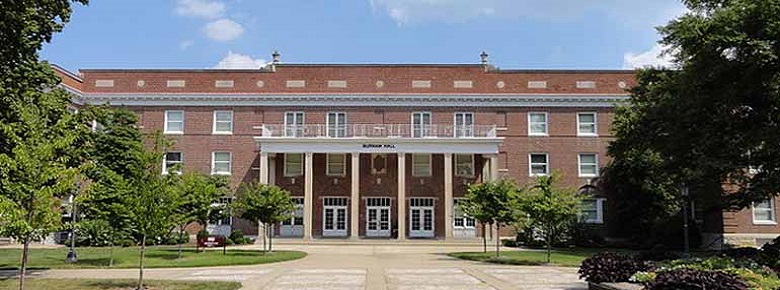
Eastern Kentucky University offers an online Bachelor’s in Psychology with a concentration in Forensic Psychology. To graduate, students must complete 120 credit hours and have the option to transfer in up to 90 qualifying credit hours. To be eligible for the program, applicants must have a GPA of 2.5 or higher.
Eastern Kentucky University is accredited by the Southern Association of Colleges and Schools Commission on Colleges.
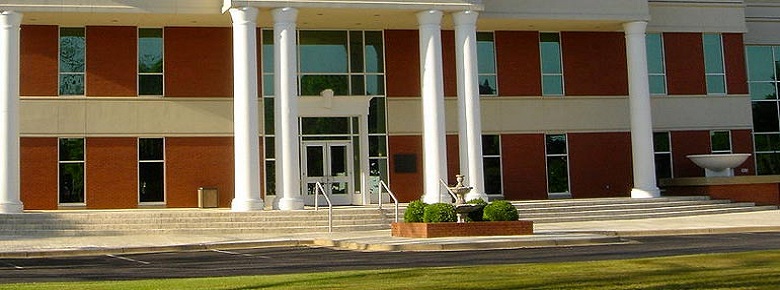
Faulkner University offers an online Bachelor of Science in Forensic Psychology degree. To graduate, students must complete 121 credit hours, including a number of psychology and criminal justice courses. Applicants that have graduated within the last 5 years must submit official transcripts and ACT or SAT scores.
Faulkner University is accredited by the Southern Association of Colleges and Schools Commission on Colleges.

Florida Tech University offers a Bachelor of Arts in Forensic Psychology degree. The program is designed to focus on child advocacy and offers small classes in the effort to give students a more personalized experience.
To be eligible for the program, applicants must submit official transcripts and SAT or ACT scores. Admissions essays and letters of recommendation are optional.
Florida Tech is accredited by the Southern Association of Colleges and Schools.

Liberty University offers a Bachelor of Science in Criminal Psychology. To graduate, students must complete 120 credit hours. Each course is offered online and is 8 weeks long. To be eligible for the program, applicants must have a minimum GPA of 2.0 and need to submit official transcripts.
Liberty University is accredited by the Southern Association of Colleges and Schools Commission on Colleges.

Louisiana State University offers an online Bachelor of Science in Criminal Justice with a concentration in Criminal Psychology. Students must complete 123 credit hours to graduate. Those interested in the program must either have a minimum high school GPA of 2.0 or an ACT composite score of 20 or higher.
Louisiana State University is accredited by the Southern Association of Colleges and Schools Commission on Colleges.
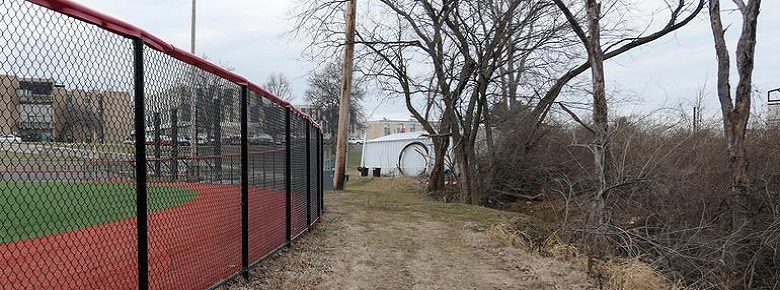
Maryville University offers a Bachelor of Arts in Forensic Psychology. To graduate, students must complete 128 credit hours, including a senior project and an internship. Applicants must have a high school GPA of 2.5 or higher and are required to submit official transcripts when applying.
The Maryville University of Saint Louis is accredited by The Higher Learning Commission.
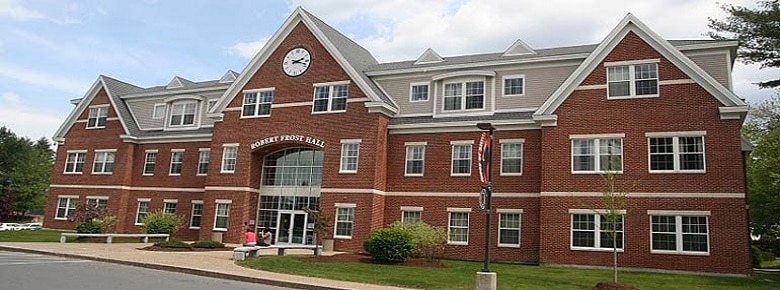
Southern New Hampshire University offers a Bachelor of Arts in Psychology with a concentration in Forensic Psychology. To graduate, students must complete 117 credit hours, including 12 credits dedicated to the concentration. The school offers rolling admission, allowing students to start studying 6 times a year.
SNHU also offers a masters in forensic psychology online.
Southern New Hampshire University is accredited by the New England Commission of Higher Education.

Walden University offers a Bachelor of Science in Forensic Psychology degree. To graduate, students must complete 181 quarter credit hours, with 35 credits dedicated towards the major and another 35 credits to the concentration.
To be eligible for the program, applicants must have a high school diploma and be either 21 years old or have at least 12 quarter credits.
Walden is accredited by The Higher Learning Commission.
Getting Your Criminal Psychology Degree Online

If you’re interested in carving out a career niche related to psychology and criminology, then you might consider earning a degree in criminal psychology.
On-campus or online bachelor’s programs can act as a stepping stone toward more advanced education and training in the field. Your studies in criminal psychology can also be applied to various roles in law enforcement and the social service sector.
A growing number of accredited schools offer online programs in criminal psychology. Online forensic psychology degree learning options typically offer more flexible schedules, so you can often balance your studies with other life responsibilities. Plus, some universities offer accelerated psychology degrees online, which may help you earn your credentials more quickly.
You can start your educational journey today by exploring schools to find the online forensic psychology degree program that best aligns with your own goals and interests.

